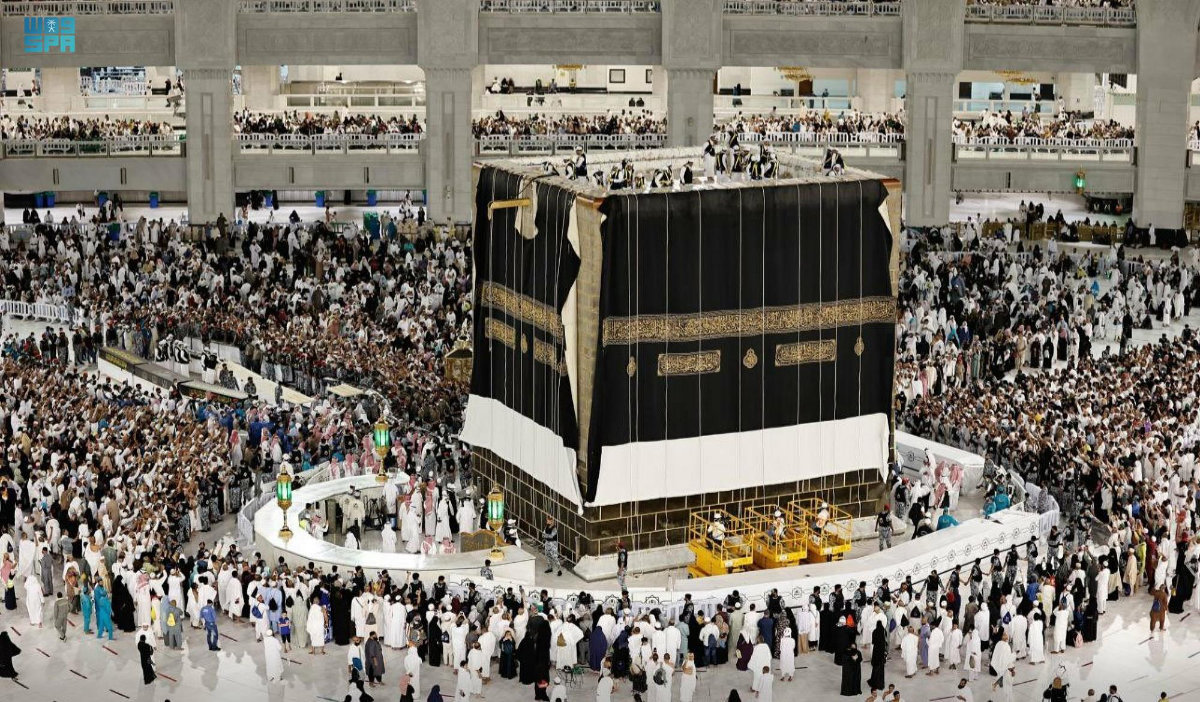RIYADH: In a change of tradition, the new cover of the Holy Kaaba in Makkah was installed early Saturday, at the dawn of the new Islamic year of 1444.
It used to be that the Kiswa was replaced once a year during Hajj, specifically on the morning of Dhul Hijjah 9 after the pilgrims go to Mount Arafat, in preparation for receiving worshippers the next morning, which coincides with Eid Al-Adha.
Last month, Saudi Arabia's General Presidency for the Two Holy Mosques announced the change in tradition so that the annual event would be held on the eve of Muharram 1, the first day in the Hijri calendar.
Sheikh Abdulrahman Al-Sudais, president of the Two Holy Mosques presidency, had said the change was being made based on a royal decision.
According to the Saudi Press Agency, the changing of the Kiswa early Saturday was carried out by a team of 200 Saudi technicians from the King Abdulaziz Complex for Manufacturing the Kaaba’s Kiswa, under the supervision of Sheikh Sudais.
Describing the process, the SPA reported: "The new kiswa consisted of four separate sides and the door curtain was installed. Each of the four sides of the Kaaba was raised separately to the top of the Kaaba in preparation for its unfolding on the old side, and fixing the side from above by tying it down and dropping the other end of the side, after the ropes of the old side were loosened.
"By moving the new side up and down in a permanent movement, then the old side fell from below and the new side remained, and the process was repeated four times for each side until the dress was completed, then the belt was weighed in a straight line to the four sides by stitching it.

Thousands of worshippers watch as the old Kiswa is replaced with a new one on the eve of the Muslim New Year 1444 early Saturday. (SPA)
"This process began first from the side of the hem, due to the presence of the gutter that has its own hole at the top of the garment, and after all sides were fixed, the corners were fixed by sewing them from the top of the garment to the bottom."
Technicians at the King Abdulaziz Complex do the weaving, stitching and printing by hand and machines using 47 pieces of cloth and thread to make the Kiswa. The world’s largest computerized sewing machine, at 16 meters in length, carries out the process.
The cloth is stitched together in five different parts and fixed to the base with copper rings. Around 670 kilograms of raw silk is dyed black at the complex.
The Kiswa is decorated with Quranic verses embroidered onto the cloth with 120 kilograms of 21-karat gold thread and 100 kilograms of silver thread.
The cost of making a new 850-kilogram Kiswa is estimated to cost SR25 million, or over $6.5 million, making it the world’s most expensive covering.




















